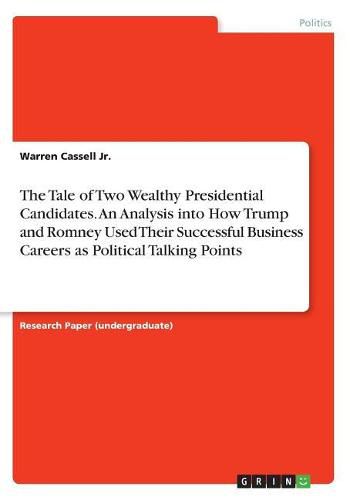Readings Newsletter
Become a Readings Member to make your shopping experience even easier.
Sign in or sign up for free!
You’re not far away from qualifying for FREE standard shipping within Australia
You’ve qualified for FREE standard shipping within Australia
The cart is loading…






Research Paper (undergraduate) from the year 2017 in the subject Politics - International Politics - Region: USA, grade: B+, The George Washington University, course: University Writing, language: English, abstract: The purpose of this research paper is to determine how the Trump and Romney presidential campaigns incorporated the business successes of their respective candidates in their political messaging. It also seeks to identify in what ways, if any, were the two campaigns similar and different in leveraging their candidates’ entrepreneurial skills. This study primarily draws upon the announcement speeches made by both candidates, as well as multiple speeches that were made at their respective nominating conventions. Prior research conducted in the field of narrative psychology analysis was used as a guide in order to better examine the above mentioned exhibits. The findings revealed that Trump leveraged his entrepreneurial accomplishments a lot more than Romney. The campaign strategies that Trump and Romney implemented might have been partially influenced by their personal narratives. The discoveries in this study can possibly be used in future research that focuses on understanding how the American electorate responds to the narratives of political candidates.
$9.00 standard shipping within Australia
FREE standard shipping within Australia for orders over $100.00
Express & International shipping calculated at checkout
Research Paper (undergraduate) from the year 2017 in the subject Politics - International Politics - Region: USA, grade: B+, The George Washington University, course: University Writing, language: English, abstract: The purpose of this research paper is to determine how the Trump and Romney presidential campaigns incorporated the business successes of their respective candidates in their political messaging. It also seeks to identify in what ways, if any, were the two campaigns similar and different in leveraging their candidates’ entrepreneurial skills. This study primarily draws upon the announcement speeches made by both candidates, as well as multiple speeches that were made at their respective nominating conventions. Prior research conducted in the field of narrative psychology analysis was used as a guide in order to better examine the above mentioned exhibits. The findings revealed that Trump leveraged his entrepreneurial accomplishments a lot more than Romney. The campaign strategies that Trump and Romney implemented might have been partially influenced by their personal narratives. The discoveries in this study can possibly be used in future research that focuses on understanding how the American electorate responds to the narratives of political candidates.